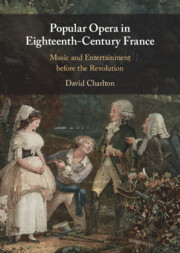Book contents
- Popular Opera in Eighteenth-Century France
- Popular Opera in Eighteenth-Century France
- Copyright page
- Dedication
- Epigraph
- Contents
- Illustrations
- Tables
- Examples
- Preface
- Acknowledgements
- Notes on the Text
- Abbreviations
- 1 Introduction
- 2 Music and Spoken Theatre
- 3 Music in Gherardi’s Company
- 4 Singing and Acting at Home
- 5 Opéra-comique en vaudevilles
- 6 Experiences of Popular Theatre
- 7 Comic and Serious Themes
- 8 Performance as History
- 9 Musical Expansion
- 10 Italian Inroads: The King’s Company
- 11 Six Methods of Synthesis
- 12 A ‘Musico-Dramatic Art’
- 13 Conclusions
- Stage Works Cited
- Bibliography
- Index
2 - Music and Spoken Theatre
Published online by Cambridge University Press: 09 December 2021
- Popular Opera in Eighteenth-Century France
- Popular Opera in Eighteenth-Century France
- Copyright page
- Dedication
- Epigraph
- Contents
- Illustrations
- Tables
- Examples
- Preface
- Acknowledgements
- Notes on the Text
- Abbreviations
- 1 Introduction
- 2 Music and Spoken Theatre
- 3 Music in Gherardi’s Company
- 4 Singing and Acting at Home
- 5 Opéra-comique en vaudevilles
- 6 Experiences of Popular Theatre
- 7 Comic and Serious Themes
- 8 Performance as History
- 9 Musical Expansion
- 10 Italian Inroads: The King’s Company
- 11 Six Methods of Synthesis
- 12 A ‘Musico-Dramatic Art’
- 13 Conclusions
- Stage Works Cited
- Bibliography
- Index
Summary
Chapter 2 continues the introductory process (1) by surveying the large part played by music in seventeenth-century plays; (2) by scrutinising the functions of music in plays; (3) by discussing perceptions of speech and music in dramatic alternation. ‘Recent Research’ introduces John S. Powell’s study of 153 plays with music and isolates key elements for popular opera: the presence of borrowed songs and vaudevilles; their dramatic functions; performative demands, especially when main actors have to sing as well as speak; and manuscripts proving that music occupied far more stage time, relative to spoken material, than appears likely from other written sources. The historical origins of ‘opera’ are problematised by juxtaposing the growth of forms that contained speech. A personal account of hearing songs in contemporary drama provides ideas that are used later in the book. ‘Molière and Music’ describes evolution in this playwright’s musical practice through Le Sicilien and Le Bourgeois gentilhomme, culminating in Le Malade imaginaire. Their types of dramatic integration are discussed. ‘After Molière’ is a case-study illustrating important increases in musical diversity: Poisson’s Les Foux divertissans, whose extensive musical score was composed by Marc-Antoine Charpentier. Various parodies of Lully foreshadow opéra-comique, as does the commonplace working milieu.
- Type
- Chapter
- Information
- Popular Opera in Eighteenth-Century FranceMusic and Entertainment before the Revolution, pp. 27 - 45Publisher: Cambridge University PressPrint publication year: 2021

